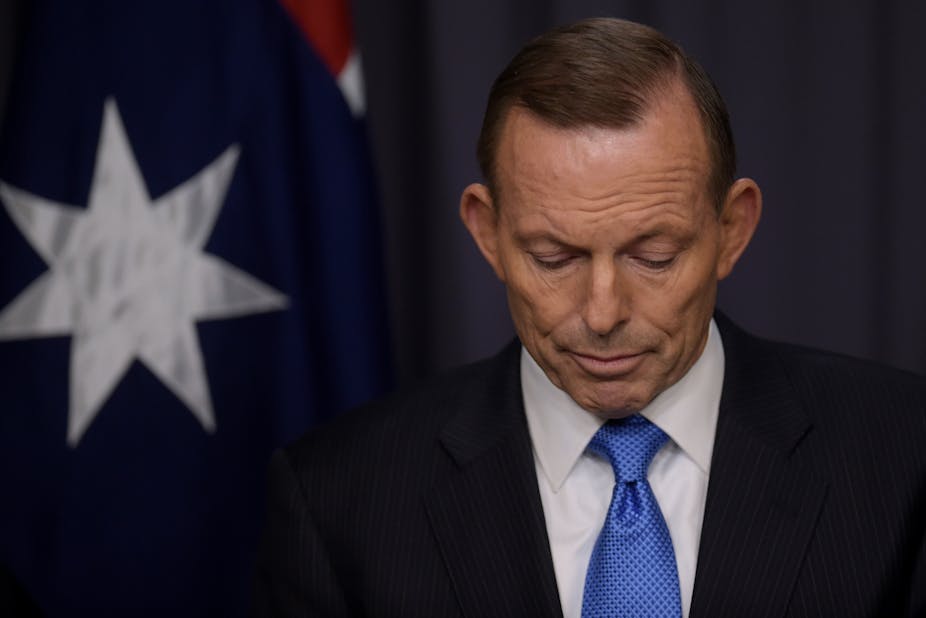In 1955, American conservative author William F. Buckley wrote a mission statement which would become the voice of the American right. The role of the conservative, Buckley suggested, was to:
… stand […] athwart history, yelling stop, at a time when no-one is inclined to do so, or to have much patience with those who so urge it.
It is an arresting vision. But, in the end, it is a slightly comic one that casts the conservative not as a sober statesman but as a circus performer. It may be that, in the end, Tony Abbott was unable to escape this fate.
As prime minister, Abbott aspired to follow in the footsteps of John Howard. The Howard formula was of an affirmative optimistic nationalism, a preference for economic – if not social – hierarchy, and an economic policy unhampered by libertarian prejudice.
Abbott promised voters a return to the prosperity of 2007, minus WorkChoices. The past is, however, another country. The economic boom that had underpinned Howard’s success unravelled from 2008 and took Labor down with it, but Abbott was slow to realise that the economic world had changed. Here, he was in (bad) company – Labor’s economic ideology was notably incoherent as well.
Perplexed by the problems of the present, Abbott too often luxuriated in the applause of cultural conservatives who fought battles against imaginary foes. The government’s royal commissions into home insulation and trade unions looked like an attempt to reboot the 2013 election campaign.
Progressives were baffled and infuriated by Abbott. In the last month a spate of media commentary cast his as a do-nothing government. This was unfair if we see conservatism as about yelling “stop”.
Abbott shifted the Coalition radically to the right on climate change and destroyed what had seemed a bipartisan consensus. He struggled to develop a substantive policy agenda in times more challenging than Howard faced.
The 2014 federal budget sought to fill this gap by resurrecting forgotten 1990s economic reform proposals, but it left voters unenthused. After this setback the government retreated to a Howardian complacency on the economy, which was at odds with voters’ experience of stagnating living standards. Abbott might have done better to promote a sense of economic crisis and then, as David Cameron did in Britain, blame Labor.
The government disappointed economic liberals by its failure, apart from aspects of the 2014 budget, to sell an economically liberal case. But this would have required it to go beyond the Howardian comfort zone inhabited by the true believers of the conservative commentariat.
The one issue about which Abbott seemed enthusiastic was Indigenous constitutional recognition. Here was an attempt to develop a positive conservatism to solve the one problem that had perplexed Howard.
Like Howard, Abbott took the turn against “self-determination” in Indigenous policy as a victory for the “conservative” cause. Abbott went beyond Howard, however, to argue for constitutional recognition, which he cast as a conservative initiative that would perfect an already near-perfect nation.
Like many other conservatives Abbott claimed allegiance to the legacy of Edmund Burke and to upholding “conservative” reform. Conservative change, Abbott declared in July 2014, was for the good if it benefited the country. Here Abbott retrod the steps of the Turnbullite republicans that he campaigned against in the 1990s.
By 2015 constitutional recognition seemed becalmed. Abbott’s modest proposals did not enthuse supporters of Indigenous rights, but most of the activist conservative commentariat such as Andrew Bolt remained staunchly opposed.
Will Abbott’s conservatism survive the tide of history? Same-sex marriage seems inevitable as does some form of carbon pricing, or at least some expensive “direct action” substitute. What may fail is Indigenous constitutional recognition, which Abbott claimed as his concession to “history”.
In 1958, economist and philosopher Friedrich Hayek declared that conservatism could not:
… offer an alternative to the direction in which we are moving. It may succeed by its resistance to current tendencies in slowing down undesirable developments, but, since it does not indicate another direction, it cannot prevent their continuance. It has […] invariably been the fate of conservatism to be dragged along a path not of its own choosing.
In 2009 Abbott and his supporters rallied opinion against Turnbull on the grounds he was being dragged down a path of Kevin Rudd’s choosing. In the end, however, Abbott’s legacy may confirm Hayek’s prediction.

